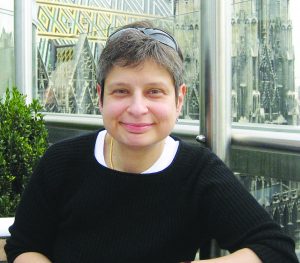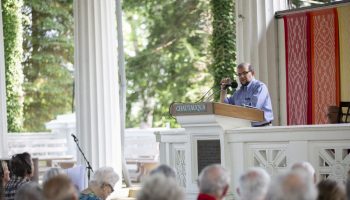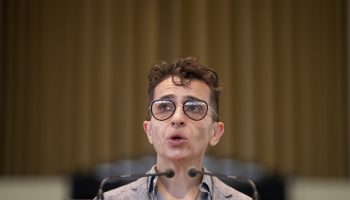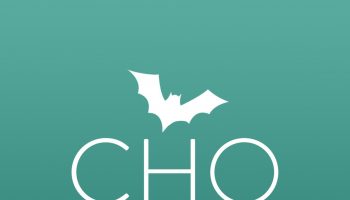Russia spans 11 time zones. Nina Khrushcheva has been to them all.
From eastern Europe to the Sea of Okhotsk, it was interesting to see, she said, just how big the country really is.

In her recent travels across the country to research her forthcoming book, In Putin’s Footsteps: Searching for the Soul of an Empire Across Russia’s Eleven Time Zones, Khrushcheva said she was trying to explain Russia through its size. She wanted to “investigate a little bit of the psychology, not just of Russians, but of Putin, and how he looks at the world and how it defines how Russians look at the world.”
And when she came back to the United States, where she’s lived since 1991, she realized something.
“If I were Putin, I would think I was a god,” she said. “He thinks that anyways. The territory just makes you think that, and Russians have reasons to think the same. When you go through all this land and encounter all the people, history and culture, you would think that. If you’re sitting in the Kremlin, you’re the god of the universe. Russia is an entire universe.”
Khrushcheva will discuss this universe — and the unique lens through which she sees it — at 10:45 a.m. Wednesday, July 18, in the Amphitheater, as part of Week Four’s theme, “Russia and the West.” Matt Ewalt, chief of staff for the Institution, said in preparing for the lecture, Khrushcheva “expressed the importance of providing a personal portrait of Russia.”
Khruscheva is professor of international affairs at The New School, a senior fellow of the World Policy Institute, a member of the Council on Foreign Relations and the Kreisky Forum for International Dialogue, author of two books and recipient of Great Immigrants: The Pride of America Award from the Carnegie Corporation of New York. Her expertise comes from years of scholarship, but her pedigree extends beyond academia: She’s also the granddaughter of former Soviet Premier Nikita Khrushchev.
It’s a name she’s proud of; it also means that at times she can be seen as nothing more than “a professional Khrushchev.”
“It depends on who I talk to,” Khrushcheva said. “There’s a curiosity, especially since my grandfather is such a figure in American imagination. Obviously, I can be dismissed: ‘What does she know?’ It used to upset me; people either wanted my opinion because I’m a Khrushchev or wouldn’t give me the time of day because of it.”
Khrushcheva’s combination of professional and personal ties to Russia often means she’s called for speaking engagements or to provide commentary as a talking head. On Monday, for example, she appeared on MSNBC’s “AM Joy” to discuss the meeting between Putin and United States President Donald Trump.
But with news coming out of Washington, D.C., and Helsinki at a rapid pace this week, Khrushcheva isn’t sure her normal approach is going to work.
“I usually provide background for what’s happening in current affairs,” she said. “This is a broad topic, ‘Russia and the West.’ There’s so many things one can say.”
She should be writing and speaking about Trump, she said, but she’s “already written it.” She’s more interested in what comes next.
“I want to talk about (what happens) after, and when any decisions are implemented, and how it will affect the political climate,” Khrushcheva said. “Whatever comes out of it will be sabotaged politically. Trump isn’t trusted, and Russia is perceived as the enemy.”
At the top of her mind, however, are the United States’ allies’ reactions to the Helsinki meeting and what she called “unfair” concerns.
“What are you objecting against?” she said. “Everyone is trying to make a deal.”
Speci cally, Khrushcheva pointed to concerns from France and Germany — countries whose leaders have met with Putin in recent months.
“I’m interested in investigating that. It seems that, in America, political language cliches are being used, and quite frankly, they’re not in line with the reality of what’s happening,” she said. “The question of allies is an interesting thing. It would be better today to say that some European leaders aren’t happy. That would be a more honest way of looking at it, rather than pretending that the West is what it once was. That’s not the case.”
The idea that Trump came in and “all hell broke loose isn’t the case at all,” Khrushcheva said. She said America has been losing moral ground for at least 25 years, and one of the problems in current affairs is “the American hypocrisy in looking at itself as the high horse, the shining city on hill — that’s not the case.”
“That rhetoric essentially gets in the way of America moving forward, and it’s not capable of looking at itself in a somewhat objective light, and not blaming someone else for losing the moral superiority,” she said. “It’s America’s fault.”
It’s not a popular sentiment, she said.
“But I think someone has to say it, (even though) I’ll be dismissed as a former Soviet, or a Russian who’s delusional,” she said.
The United States and Russia are “similar but contradictory at the same time,” Khrushcheva said. Both, for example, are frontier nations. In the 1830s, while Alexis de Tocqueville was traveling through America, Astolphe de Custine was doing the same in Russia: “Two Frenchmen from the center of Europe, in the frontier nations, describing those nations,” Khrushcheva said.
When she was traveling Russia, seeking to describe it, she too saw those contradicting similarities.
“What struck me is how homogenous Russia is,” Khrushcheva said. “In a sense, the driving identity is the identity of Russian civilization itself, which is long. But Russia defines itself, in a remarkable way, as what the West is not — which makes it Western, despite itself.”




